Quick take: Is the Affiliate Lab cost worth it?
This is by far one of the best "Make money online" courses ever. It's extremely detailed and straightforward and I estimate it generated millions of dollars for affiliates big and small.
The Affiliate lab costs $997 and while it might initially seem expensive, it's absolute peanuts compared to what you get. I asked Matt for a discount so you can get $200 off by clicking below:

The Affiliate Lab is an epic SEO affiliate marketing course that puts all the pieces of the SEO and affiliate revenue together. It requires multiple SEO strategies that work in sync to rank your intended keywords to the top of the search engine. It’s also a great course for bloggers who want to monetize. And to think I bought it to learn only a portion of what’s in the course!
Now that we have the TLDR out of the way, Let’s take a deep dive into the details…
[Part 1] Things you should know about Affiliate marketing & Matt Diggity
If you know about Matt and the legitimacy of the affiliate model already you can go ahead and skip this section. However if you are wondering about this Matt guy, or if his methods are legit, read on!
Does affiliate SEO work?
Yes it does! Before I started monetizing with display ads, I only did affiliate marketing on a niche site. I managed to rank for some decent keywords. Not the most lucrative, but I ranked for two keywords that together generated $10,000+ per month in commissions.
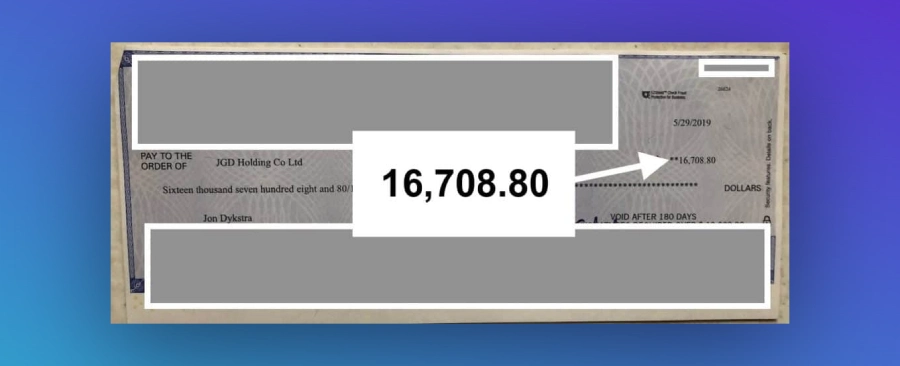
Build your affiliate business | Example of affiliate commissions above
So I can tell you from personal experience that it works. Over time, you strive to rank for more and more lucrative keywords and your incomes goes up. I’ve long went the display ads route (I have multiple authority sites with tons of content) but now I’m focused on adding affiliate revenue to them.
But according to Matt, you don’t even have to build up a huge authority site to rank for good keywords if you follow his methods. You can gun for them out of the gates even if your site isn’t big.
Who’s Matt Diggity?
Matt Diggity is an authority on Affiliate SEI & SEO in general. If there’s something that irks me to no end, it’s those who make their money…by teaching others how to make money. That’s one of the reasons why I like Matt Diggity. Like me he is NOT in the business of selling courses, he’s in the business of actually making money from niche sites.

It’s the same with SEO. Many individuals who write about SEO and offer SEO courses typically have just one website – the very blog on which they share their SEO knowledge. It’s classic self-fulfillment marketing (which I find distasteful). Matt is different. His Diggity Marketing blog is NOT his only site.
He owns and has owned many successful affiliate websites in many niches so he actually knows what he’s talking about. He also is the creator of the Chiang Mai SEO conference, one of the best SEO events every year that I hope to attend someday when the kids are a bit older. I trust the guy so much I consulted with him a while back for 4 figures, and it was well worth it.
What’s the point of this affiliate marketing course?
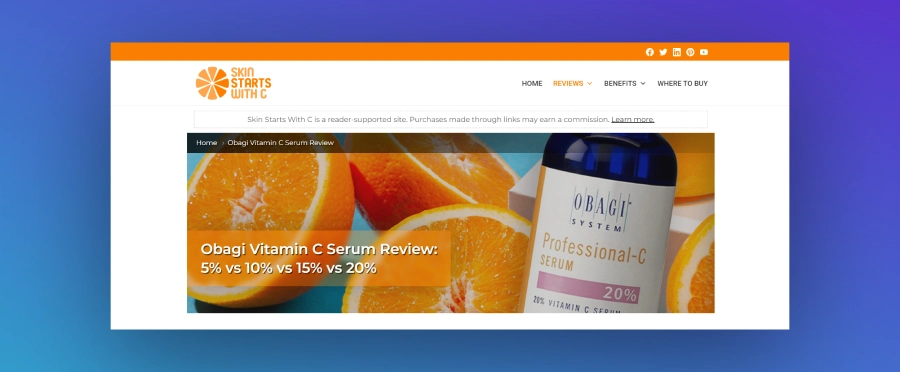
The Affiliate Lab course shows A-Z how to do successful affiliate marketing by ranking your pages on Google with SEO. When you have a carefully written article, designed in a specific way rank on Google, you can make thousands of dollars per month. You can then go ahead and flip that site for 32x its monthly value (the course covers flipping) . So a site making $5000 can be sold for $160,000. It’s really an SEO affiliate marketing business in a box, especially with the wealth of bonuses you get with it (more on this below).
Other affiliate courses largely focus on ads, funnels or other methods other than organic traffic. Just a note that the Lab’s SEO strategies still stand to this day. I am aware of a course that taught somewhat similar things but that went on the way side because it relied on tricks that got patched.
Who is it for?
This is for three kinds of people. The first is those new to affiliate because it starts from scratch. The second is those with established websites who want to branch out and create affiliate articles that rank. And finally this is for anyone who wants to get more traffic. Matt Diggity’s affiliate lab course is a comprehensive SEO course by itself even if you remove the affiliate part. I can’t imagine there being anyone who buys Affiliate Lab that doesn’t learn something. Take it from me, I’ve been publishing sites for a living since 2012 and I learned a ton.
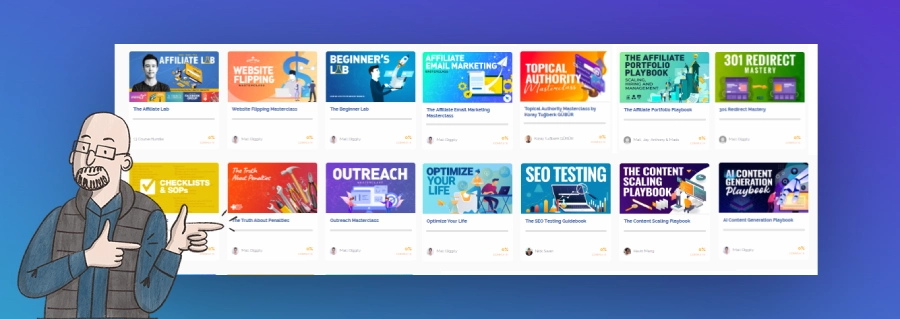
I knew I was going to buy the LAB so I didn’t even read the sales page when I clicked “buy”. Oh boy is this a monster of a course bundle. I didn’t know there would be a good number of additional modules & bonuses that applied to me. Not only does it contain the main course but there’s also 15 bonuses that each teach something designed to get you traffic and make you a profitable affiliate as fast as possible.
The section below is more an overview of what’s inside the affiliate training and a breakdown of all the bonuses. By the way, some of the bonuses are NOT listed on the salespage! So these were a nice surprise if you ask me.
If you want my personal Affiliate Lab review and opinions, that’s the next section. Here’s what you get with the course by Matt Diggity:
1. The Affiliate Lab Core Training
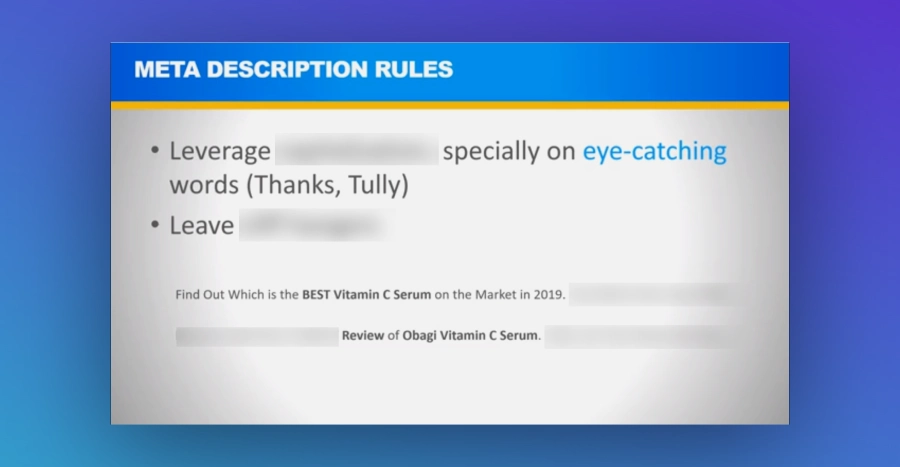
Affiliate lab is an online course delivered on the Teachable platform (a very good course platform… the same one I use). Because it has so many videos, info and modules, Matt broke it up into multiple courses where each course is broken up into multiple sections. Each section has anywhere from a few to 10+ video lessons.
I’ll touch on more details in the next section, but there’s everything you need to go from complete zero to a potentially wealthy affiliate. Matt teaches what I like to call the “rank n’ bank” model and it’s highly effective assuming you do rank for your intended keyword. An example keyword would be “best bodybuilding supplements” where you promote a high-commission bodybuilding supplement. Another example would be “best travel credit card” where you promote a credit card geared toward travel rewards and has a generous affiliate program attached.
As an aside, Matt has a section devoted to how he does keyword research that will help you pinpoint the exact keywords you need to rank in your chosen niche that are loaded with buyer intent. If you don’t know, buyer intent keywords are keywords that searchers use who are darn close to buying something. They just need a slight nudge and the commission in yours.
Every aspect you can think of is covered: Niche selection, site layout, site structure, interlinking, silos, authorship, schema, copywriting, meta descriptions…you name it, it’s in there. I’ll tell you a bit more about what I really liked in the next section. Here’s a breakdown of all bonuses, even those not on the Sales page:
2. The Beginner’s Lab:
What’s Wordpress? How do you set up your website? If you are new to affiliate marketing or websites in general, everything is covered here. If you’ve ever had your basic blog or site you can safely skip this but it’s essential for newcomers. Any successful affiliate marketing business starts with a domain and hosting after all.
3. CRO Masterclass:
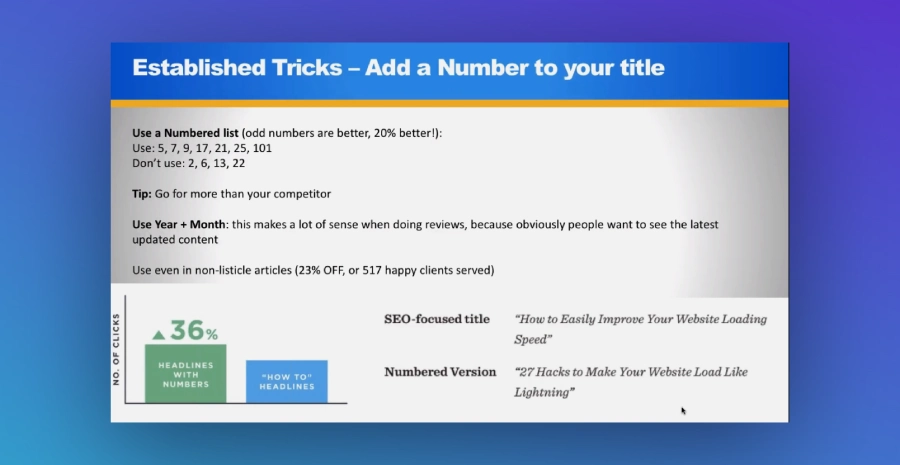
In his words, CRO is Matt’s favorite because it’s instant. Change a few things and clicks, sales can go up drastically. In this bonus you’ll find the secrets of crafting the “perfect” high converting affiliate page that brings in money. This bonus alone is worth its weight in gold if you already have a site that’s ranking.
4. Featured Snippets Masterclass:
This is a bonus by a guest speaker Tom De Spiegelaere. I’ve never heard of him but after this short presentation I’m a fan. Featured snippets is an extremely lucrative place to be because it’s above the first result on Google, that’s why it’s called position 0.
Tom excels at acquiring featured snippets, despite competing in the tough-as-nails electronics niche. He reveals his methods that “baits” Google into giving you the featured snippets. He also shares a strategy of his on how he keeps beating his competitors. With his techniques, I’ve already won a few snippets myself.
5. Authority site blueprint
Authority sites are a different beast than niche sites. If you are willing to go bigger, this excellent module covers site structure, backlinks and -yikes- easy to fall-in pitfalls. He shows how he got one authority site that wasn’t ranking for new content to start ranking instantly. Lastly this dives into E-A-T and how to build it.
6. Flipping Masterclass:
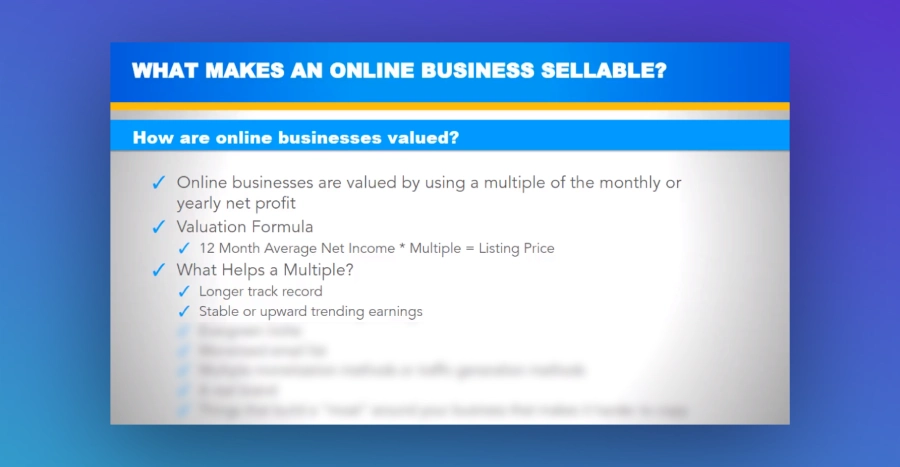
Wow, what a treat. Matt has all the authority and experience to teach about flipping (He flipped millions worth of sites) but instead of him teaching his techniques, this bonus is from Gregory Elfrink. Why that is such a big deal is because he’s a key member of Empire Flippers, the marketplace where you can buy and sell websites.
No other person is so well suited to tell you EXACTLY what makes a site attractive and sell for high multiples. There’s some VERY juicy detail here I wish I knew before flipping my sites.
7. Outreach Masterclass:
This is a whole bonus dedicated to outreach. Link-building is not my cup of tea but he covers it very thoroughly on how to cold email bloggers and get them to link to you. We’re talking about how to prospect, how to follow up, how to manage your outreach, the different kinds of outreach and even…the best time of day to send your outreach. Nuts!
8. Website Recovery Kit:
I like this bonus, even if I hope never to use it. This is basically all that Matt does to a site if it’s either stuck or starting to dip. He has successfully reversed bad traffic dips and penalties so this is very useful “In case of emergency, break glass” kind of info. I’m not sure I’ll ever use it but just knowing this information did wonders for my peace of mind. Despair is not the answer, this recovery kit it.
9. Affiliate Email Masterclass:
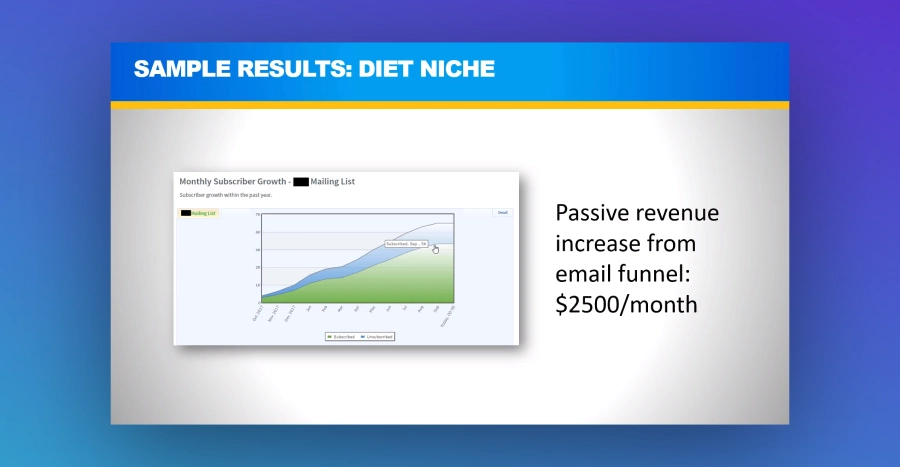
Bad news: Most people will never come back to your site once they click on your affiliate link (or hit the back button). Capture their email first and you can sell them over and over again. This bonus goes through the setup of how to collect emails, setting up an automated cash machine with an autoresponder and how to send email blasts that sell. It takes a little bit to set up but an email list is one of those things that will allow you to withstand any traffic problem for a while.
10. Affiliate Portfolio Playbook:
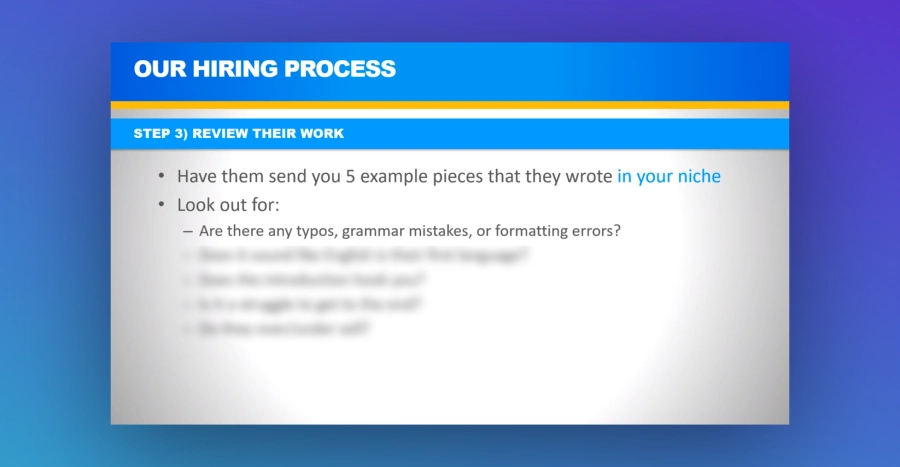
One of the hardest aspects of this business is scaling. It’s one thing to bootstrap a single niche site by yourself to $10,000+ per month but an entirely different skill set to scaling the business by hiring and training people to exponentially grow the business model. I have a fairly large team of folks working for me but it’s not without some problems so I found Matt’s insights on scaling this business helpful.
This bonus is based on the DISC framework of Mad Singers, a management consultant for SEOs. This bonus is pretty extensive with Matt’s input on how to hire, manage and motivate all potential affiliate related positions: Linkbuilders, Developers, VA & more.
11. Optimize Your Life
Matt is a health nut. And while this bonus might seem like it has no place in an affiliate SEO course, it still stands that your quality of work is directly dependent on your health. If you’ve ever tried to work after a hangover, you know what I mean. This is an interview between him and Kyle Roof. It goes through his morning routine, diet and other health aspects. You’ll know exactly how he safeguards his physical health so that he can kick butt on Google.
12. SEO Testing Crash Course
This is a short but sweet bonus by Nick Swan on how to conduct SEO tests. It’s pretty straightforward but can also be wildly profitable. Better reserved for more advanced users who want to develop their own SEO techniques and keep ahead of your competition.
13. Content scaling playbook
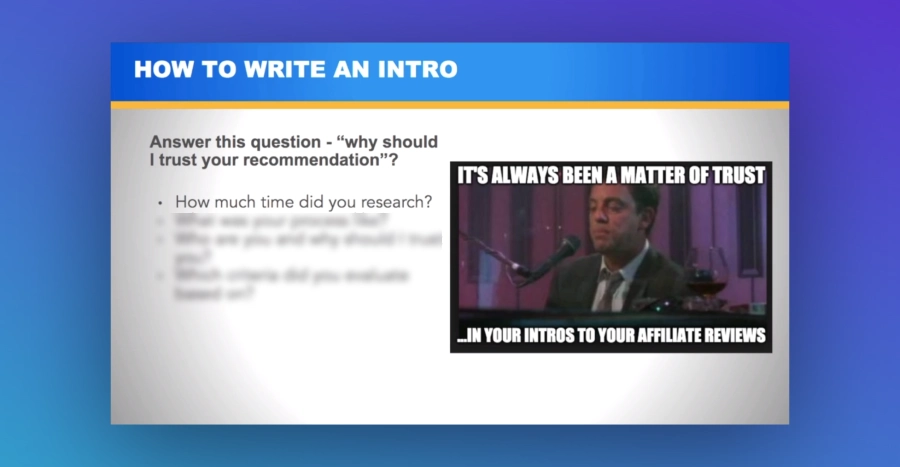
Content is the lifeblood of a site. In this bonus, Web copywriter Kevin Meng shows you how to quickly evaluate applicants to determine their value. It’s pretty eye opening even if I hired tons of writers before. There’s also a great section on how to write article intros that hooks and compels the reader to read. I’ve started to use it everywhere and seen great improvements in engagement.
14. Topical Authority Masterclass:
If you don’t like linkbuilding, this is for you. This awesome bonus by Koray Tuğberk GÜBÜR shows you how to achieve topical authority in your niche without link building. It shows you how to build a topical map and what to cover so that Google trusts you. You can skip the first part as it goes really deep into patents but the rest is pretty straightforward. Works great alongside the authority site module.
15. 301 redirect mastery:
If you weren’t convinced that the Lab is the ultimate in SEO this should do the trick. You guessed it, this is a bonus that focuses on redirecting link juice to your site. Why should you bother? It’s a tried and true strategy to buy a site to redirect it to another site, passing on the SEO value. What’s been a bit surprising actually is finding out that redirects (Matt says as a last resort) can be used for successful penalty recoveries. This is a little bit advanced so look away if you are a beginner.
16. AI content generation playbook:
The final bonus is all about AI generated content with some strategies by Taylor Kimball. It doesn’t go too deep in the subject (AI content is pretty straightforward) but you get an insider’s view of Matt’s internal processes and how to scale this type of content easily. Taylor’s A.I. strategy on keeping safe is one I am currently using.
17. The Facebook groups
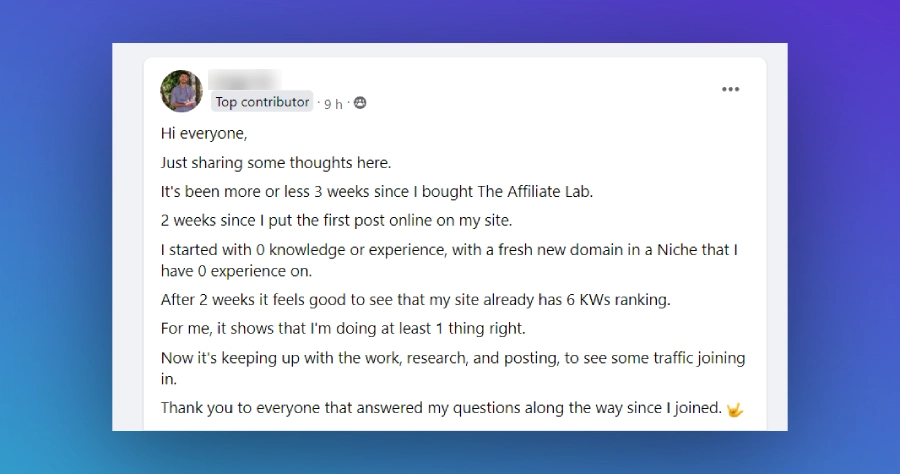
When it comes to community you have full, lifetime access to the Affiliate Lab Facebook group. This is a group with 3700 members including a LOT of heavy hitters. Like the guy above agrees, everyone is extremely helpful as it’s pretty active (5-10 posts a day). There’s another invite-only Facebook group that you can get in if you flipped a site for 6 figures.
[Part 3 ]My Affiliate Lab review: The good, the meh and the awesome
To date, the lion’s share of my revenue is from display ad revenue. I love earning steady, growing revenue from display ads and I have NO intention of quitting it. However, a colleague who knows my niche sites pointed out not too long ago that I’m leaving an absolute ton of money on the table.
That’s why I got the Lab and after watching everything and applying it, here’s my personal Affiliate Lab review:
Pros & Cons
- All you need for Affiliate SEO success
- Battle tested, proven methods
- Lots of tools like Niche research sheet
- Cheap compared to what you get
- Lifetime updates
- Great FB group
- Lacks written material
- All sales final
Like: The only affiliate SEO course you’ll ever need
I am not kidding when I say that the course is comprehensive. Everything is covered from knowing nothing about affiliate all the way to earning you money. Every aspect is covered as this is like getting a bundle of 16 courses. Featured snippets? There’s a bonus. The amount of exact match links that need to go to your pages? There’s a video about it. 301 redirects? There’s a bonus about it. By the way, even if you cut the strictly affiliate aspect of it, you’d still be left with one of the only SEO courses you’ll ever need.
REALLY Like: Many of the bonuses are worth the price alone
I’ll be blunt. Some of these bonuses are worth the entry price alone (and I’m talking the FULL $997, not the $797 special offer you get). Having one of the Empire Flipper guys tell you exactly what sells for example is nuts, and insanely profitable. The CRO bonus too is worth the price tag alone. It’s all highly tested stuff for getting higher clicks and sales and having everything just given to you instead of you wasting months on testing is well worth over $997 alone if you ask me.
REALLY Like: Tested SEO
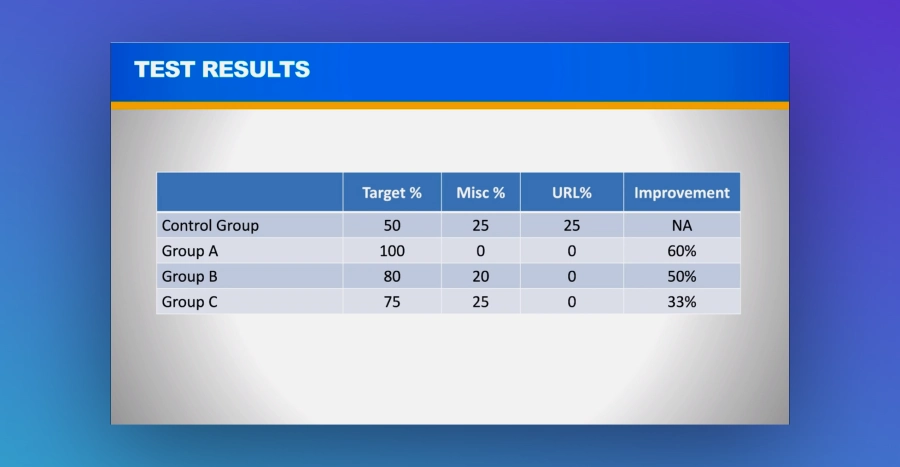
Speaking of which, Matt tests EVERYTHING, not just CRO so this is probably the single biggest reason to get this course. We are talking about hundreds of dummy sites that he constantly tests. When he finds something that works he does two things: He applies it to his client sites & reveals the good stuff in the Affiliate Lab.
While he felt stuck as an engineer, I think his past skills really helped him here. It’s really deep testing too, for example he tested the ratio between commercial vs information content you need, the ratio of exact match anchor links you need to go in your pages, etc. It’s great to have everything he says being tested as for a lot of SEO gurus out there, YOU are the guinea pig!
Mind blowing: The Million-Dollar “Pure Gold” Info
Great courses are a mix of the basics and advanced info. While it starts from scratch, what really got me is the “pure gold” info that offers nuanced, highly effective tips for veterans. Affiliate Lab is no exception. It too offers a good variety of “pure gold” info that justified my purchase. Here’s a smattering of what was the “pure gold” for me:
Niche site vs. authority site discussion. One module I found fascinating was Matt’s discussion on distinguishing niche and authority sites. It’s a topic near and dear to me. I tend to focus on authority sites but I recognize the advantages of smaller niche sites. Matt operates in both. He’s highly knowledgeable about both. In fact, he makes one point that distinguishes both that I found very, very interesting. Sorry, I can’t reveal it here, but the niche vs. authority module is well worth the price of admission on its own for me. Because knowing what you want to build will dictate how you go about it because there are key differences between niche and authority sites with respect to Site architecture, and Content topics.
Site architecture: His site architecture module is amazing. I definitely have some improvements to make when it comes to site architecture. What I especially appreciate is how he makes it clear that site architecture will differ between a small niche site and authority site. He’s right on this because the two are different. Nevertheless, I definitely have some architecture improvements to apply to my authority sites.
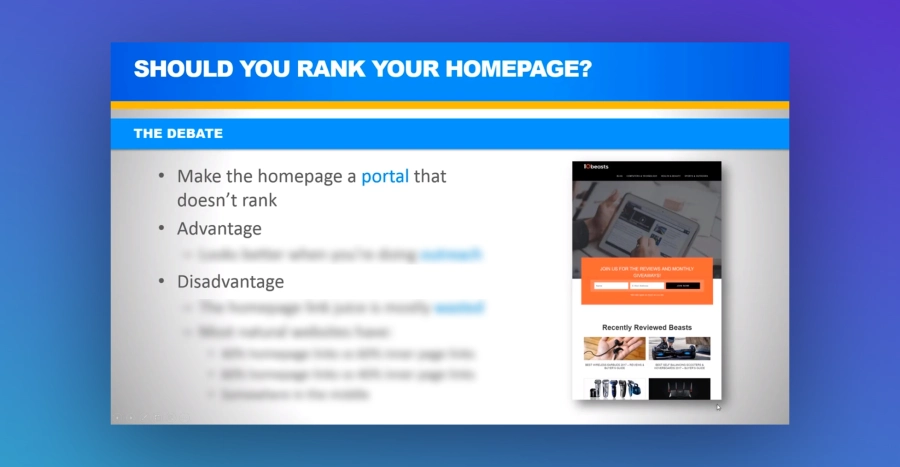
High converting affiliate landing pages: I doubt there is anyone who knows affiliate CRO better than Matt. He loves this stuff and he’s tested it extensively… far more than I have. His on-site affiliate CRO info is “pure gold”.
Schema markup tips: I’m fairly adept at implementing schema markup for snagging search traffic but Matt has tested this far more than me. His schema markup observations are “pure gold” and is also “must-know” information for niche and authority site publishers.
E-A-T / YMYL / Trust Factors: There is probably nobody on the planet who knows how to bolster trust factors on a niche site like Matt. Heck, he ranks for insanely lucrative keywords in niches directly impacted by E-A-T and he does so by taking steps to bolster trust and credibility on his niche sites (even though he himself does not have the requisite expertise). I’m not in niches that are so affected by E-A-T, but IMO, trust and credibility will grow in SEO importance so once again, this is must-know info for any website publisher.
Meh: Format
Content is delivered through high-quality, short videos for easy consumption. So no need to sit down in a 4 hour video wondering where you are. However, the lack of text versions or summary notes may be inconvenient for some who like to read fast. This is the only drawback I’ve found. Since the videos are slide based, it makes it easy to skip a bit and just read the slides.
Love: The price

The Lab doesn’t make much for Matt in terms of money. That’s GREAT news for you because that means the Lab is constantly updated since Matt isn’t dependent on it as a source of income (it’s a labor of love). I’ve had courses that “died” right after they came out while the Lab has been growing more and more valuable as time goes by.
By the time I had to update this review, there’s a new Copywriting, AI content & Management module added. But that’s not even the best part: This is LIFETIME access. That’s once again only possible because Matt makes money with his affiliate sites. So the price ($997) is nuts for the value you get.
But it gets even better: He offered my readers $200 off instantly. So it’s just a $797 investment for lifetime access and updates.
All sales are… NOT final
This is a key update. As of June 8, 2023, Affiliate Lab will issue a refund within 30 days of your purchase “for any reason you’re not satisfied.” It’s a solid refund policy. All you have to do is ask in writing withing 30 days of your purchase.
REALLY LIKE: Link building
Like I said before I’m not really into link building but I had a look at some of those modules as well and I could tell it’s very, very good. It’s all tested to a T so if I were to embark on some aggressive link building, I’d follow it. Because while I’ve done well without it, I’m not so naïve to believe that link building doesn’t work. It works great.
The key is to do it in a way that is both effective and minimizes risk of an unnatural link-building penalty by Google. Chances are, if you want to rank for keywords that can earn tens of thousands per month, link building is necessary. If that’s the case, Matt link building information is second-to-none, just like all of the course.
REALLY Like: Niche & Keyword Research

One aspect I appreciate about Matt’s model of Affiliate SEO is that niche selection is more science than art than other publishing models (such as what I do with display ad monetized sites). Matt illustrates this where he explains that his first niche maxed out at $4,000 per month but his next niche site skyrocketed to $50,000.
What’s more amazing is, both niches required the same effort to rank. While Matt doesn’t say “choose this niche” the module is helpful because he sets out his niche selection guidelines plus a good list niche attributes to AVOID in choosing a niche. When you put together his lists of what to look for and what to avoid, it helps filter out many niches leaving you with short, manageable list. An example of niches he suggests you avoid are niches where Amazon is the primary merchant to promote as an affiliate.
Matt is not a fan of the Amazon affiliate program. He explains in detail why this is the case. That said, the methods taught will work equally well promoting Amazon as other merchants. Matt just doesn’t care for niches where Amazon is the main affiliate revenue source. Accordingly, if you’re going to pursue affiliate SEO, Matt’s niche selection module is critically important. For me, while the module was definitely helpful, I’m using Affiliate Lab techniques to bolster affiliate revenue on existing authority sites. However, if I were starting an affiliate site from scratch (or buying a website), I’d follow his guidelines.
Love: Building a trusty website
Affiliate Lab spends a lot of time teaching how to build up a credible and trustworthy website. Google is putting more and more importance on referring searchers to sites that are credible. This means that the information is accurate and reliable. For topics that are best-served by expertise, Google wants to ensure it sends folks to content published by experts.
While Matt is no expert in most of the niches he jumps into, he’s a master at building up websites that are credible… or at least communicates to Google that it’s trustworthy and worthy of search traffic. The “trustworthy” consideration cannot be overstated.
I agree with Matt that this is a very important aspect of building up a successful niche site. I put a big effort into bolstering credibility on my niche sites. I suggest you do the same and a good starting point is to follow Matt’s methods for doing so. One simple way to bolster credibility is to set up social media accounts for your sites. While this alone isn’t necessarily sufficient for building the requisite credibility, it’s necessary.
REALLY Love: I made 15x my investment in a year
Does the Affiliate Lab work, you bet! I had a small seasonal site that I wanted to revive. I used what the Lab teaches on interlinking, clusters and CTR optimization. Results? See below:

It’s from the period of October-May and while it’s not too much, I’m ecstatic at the results. I’m primarily a publisher and the affiliate stuff is just an add-on for me so for a year the Lab just added about $15,000 to my pockets.
I can only imagine what happens if you start with an affiliate site in mind (and don’t pick a seasonal niche). If you look at the people on the TAL page, there’s folks that make this in a month. While it’s very tempting to me to go make some new sites, I’ll be content to just add affiliate income to my display ads site. To each their own!
Review breakdown
Affiliate Lab Ratings
-
Unique, Actionable Information
-
Applicable to Beginners and Veterans
-
Thoroughness
-
Content Delivery
-
Organization
Final Verdict: Should You Buy Affiliate Lab?
The Affiliate Lab by Matt Diggity is absolutely worth it. It’s one of the best affiliate SEO courses that I have ever went purchased because it is in-depth and highly tested. After getting this course, you’ll have the perfect site designed to attract and convert buyer intent traffic like clockwork. A slight drawback is the lack text version (or short notes) of the videos. I prefer reading than watching videos. Otherwise, it’s a perfect course (I don’t say that lightly).
The Affiliate Lab alternatives
If the Affiliate Lab’s price tag is too high for you even with the $200 off coupon, then here are some alternatives you can pick:
A note on Niche Site Profits
This is where many so-called “reviews” start bashing on the course they are reviewing in order to promote their own. Lame.
 I encourage you should buy the Affiliate Lab if you can, but if you are thinking between my course (Niche Site Profits) or Matt’s, here’s the differences. The Affiliate Lab is highly focused on SEO + Affiliate CRO and doesn’t shy away from link-building, 301 redirects & more. Niche Site profits on the other hand focuses on low competition keyword research, high-volume content production and display ad monetization. So they not only teach different things, the approach is also different.
I encourage you should buy the Affiliate Lab if you can, but if you are thinking between my course (Niche Site Profits) or Matt’s, here’s the differences. The Affiliate Lab is highly focused on SEO + Affiliate CRO and doesn’t shy away from link-building, 301 redirects & more. Niche Site profits on the other hand focuses on low competition keyword research, high-volume content production and display ad monetization. So they not only teach different things, the approach is also different.
Since Matt ranks in tough-as-nails niches like health, his approach is very technical and that can put off some. I like things that are more fun. So my approach is more fun blogs with a lot of content. But at the end of the day, both my approach and Matt’s approach strive toward building out high-earning passive income websites. To each their own!
Authority Site System
 This has a larger price tag than the Lab so if the issue is budget, look elsewhere. The Authority Site System is all about creating authority sites, while affiliate marketing is one aspect of it. There’s great production value with talking heads of Gael Breton but the downside is, while the Lab doesn’t pull punches and is complete, TASS reserves some of the better information for their even larger course.
This has a larger price tag than the Lab so if the issue is budget, look elsewhere. The Authority Site System is all about creating authority sites, while affiliate marketing is one aspect of it. There’s great production value with talking heads of Gael Breton but the downside is, while the Lab doesn’t pull punches and is complete, TASS reserves some of the better information for their even larger course.
Making sense of affiliate marketing
 Making sense of affiliate marketing is a great alternative for beginners on a budget. But while this is about making money as an affiliate, it’s mostly about making it with email and not so much with affiliate SEO. So that might or might not be something you want to explore. Note: Matt also has an affiliate email bonus but it’s nowhere near as thorough . Compared to the Lab, this course is somewhat of a one trick pony but this is the best alternative for those on a budget.
Making sense of affiliate marketing is a great alternative for beginners on a budget. But while this is about making money as an affiliate, it’s mostly about making it with email and not so much with affiliate SEO. So that might or might not be something you want to explore. Note: Matt also has an affiliate email bonus but it’s nowhere near as thorough . Compared to the Lab, this course is somewhat of a one trick pony but this is the best alternative for those on a budget.
Easywins.io
 If you already have a site that’s ranking and earning, the Lab is great for intermediate to advanced affiliates. But what if you don’t have much time? Easywins is an alternative that might fit the bill. It’s a collection of 120+ tactics to 10x your site income with easy wins. It’s from Musfiq who has hundreds of flips under his belt and this is what he looks for when buying a site.
If you already have a site that’s ranking and earning, the Lab is great for intermediate to advanced affiliates. But what if you don’t have much time? Easywins is an alternative that might fit the bill. It’s a collection of 120+ tactics to 10x your site income with easy wins. It’s from Musfiq who has hundreds of flips under his belt and this is what he looks for when buying a site.
It’s pretty much in line with the CRO aspect of the Lab and it also comes with a short course and a few site breakdowns. If you can, get both the Lab and Easywins, they complement each other well. I’ve implemented 9 of the tips and my revenues have increased on my sites.
FAQ
Is Affiliate Lab good for beginners?
Yes, it is. There is an entire module for beginners to get going with the basics and then continue with the more advanced modules. Affiliate Lab is a true “A to Z” course on ranking for powerful keywords and printing money from affiliate offers.
Is Affiliate Lab a good course if I monetize mostly with display ads?
Yes, it is assuming you also like the idea of diversifying your website revenue with some lucrative affiliate offers. If you have a site earning with display ads, it’s a no-brainer to incorporate some affiliate revenue. In other words, it’s not either/or, but instead it’s both working together to increase the revenue of both monetization options. Does Affiliate Lab only teach link building? Affiliate Lab teaches link building in incredible detail but the course is so much more. It teaches site set-up, site architecture, on-site seo, affiliate conversion rate optimization, scaling niche sites, niche site email marketing and website flipping. It really is an A to Z niche site course.
Does Affiliate Lab teach white hat link building?
Yes, it does. Affiliate Lab incorporates several link building methods including white hat models.
Do I need to build a PBN to build links as taught in Affiliate Lab?
No, you don’t. Matt doesn’t rely on PBN links like he used to. These days he takes different approaches to building links.
Does Affiliate Lab teach how to find and choose a good niche?
Yes, it does and it offers a ton of good info about this. However, it teaches it in a way to choose niches that are affiliate-marketing focused that includes some highly lucrative affiliate marketing opportunities.
Does Affiliate Lab how to earn more affiliate commissions from existing content?
Yes, it does. In fact, this is one of my favorite modules because I have tons of ranking content where I can increase revenue by incorporating affiliate links.
Does Affiliate Lab show an example website I can check out to see how to go about things?
Yes, there is a sample affiliate niche site that the course uses as an example. I found this very helpful.
Does Affiliate Lab teach how to grow a niche site into an authority site?
Yes, it does. In fact, these days Matt is focused on growing his portfolio into a portfolio of massive authority sites. I really appreciated how the course addressed affiliate marketing with authority sites since I too focus on authority sites.
Does Affiliate Lab teach how to write and publish content that will rank in Google search?
Yes, it does. Matt reveals his preferred content sources and has an entire series dedicated to publishing excellent content that can rank.
Does Affiliate Lab offer a community forum or a private Facebook Group?
Yes, the course includes access to a private Facebook Group.

Jon Dykstra is a six figure niche site creator with 10+ years of experience. His willingness to openly share his wins and losses in the email newsletter he publishes has made him a go-to source of guidance and motivation for many. His popular “Niche site profits” course has helped thousands follow his footsteps in creating simple niche sites that earn big.
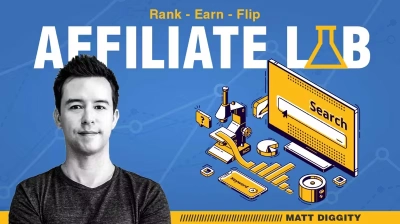


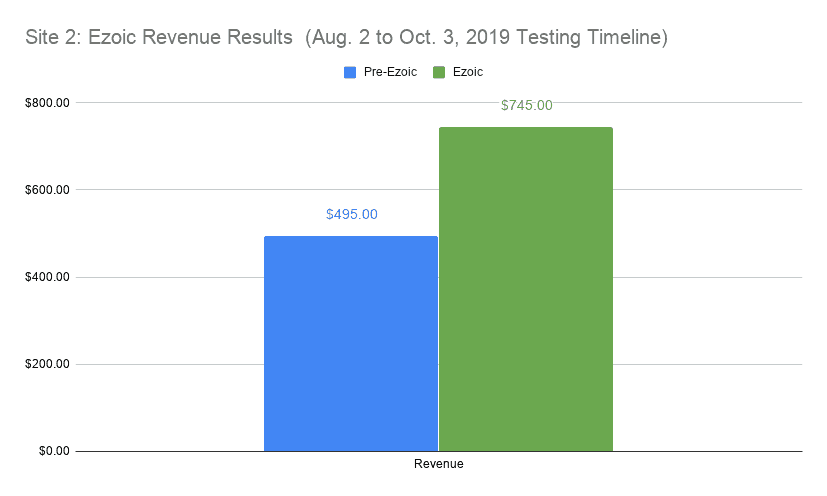




I don’t usually see you talk about someone (or some courses) like this. I added this course to my wishlist, but by now I don’t have enough savings. Thank you so much for the detailed review, Jon!